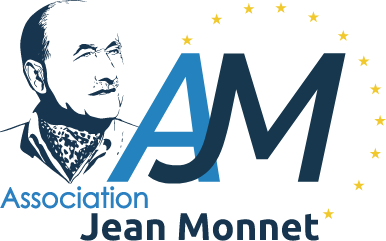The title of my speech, Limits and delays in European governance: are solutions beyond the EU's regulatory borders possible, touches on a subject with which we Europeanists, inspired by the thought and action of Jean Monnet, are very familiar. The governance of the European Union is proving insufficient to provide adequate responses to the crises we have been experiencing for over 20 years.
I make no secret of the frustration I feel every time anti-European positions appear in the media and in political debates in the Member States, or simply negationist positions expressed by so-called experts who confine themselves to mentioning the EU's many delays without proposing any possible remedies, however limited, belated or incomplete.
In preparation for today's speech, I read the Memoirs of Jean Monnet and I would like to thank the AJM for this gift, which I received on my first visit to the house-museum in Houjarray. The memoirs of a man who, with great determination, skill and political wisdom, influenced the lives of us all. His memoirs not only tell us about the experiences he lived through, from the First World War to the construction of a united Europe, but are a valuable invitation to reflect on today's problems, which are no less serious and no less dramatic than those he describes in his memoirs.
I wonder whether we are capable of imagining a path that cannot be shared by all the EU member countries, but only by some of them, and that could provide the EU with a more effective and autonomous strategy. Or, quite simply, should we resign ourselves to Europe's decline?
I have spent a large part of my academic life studying, teaching and writing articles and books on the economics of the EU, and I have always been, even in the most difficult periods in the history of European integration, a convinced European. Today, like many of us, I have not changed my mind, but I am very sceptical about the EU's ability to deal with the many problems that have arisen over the last 20 years. I fear that we will face even more complex problems with the 'new' President Trump, who during the election campaign reaffirmed a strong vision of American greatness in a multipolar world characterised by exploding wars, trade protectionism, man-made climate disruption and the growing threat to freedom and peace in the world.
The EU is lagging behind in many areas: the decline in its competitiveness in relation to the major global players (China and the United States), the delay in the environmental transition, in reducing dependence on external suppliers of advanced technologies (AI and 5G), the lack of an industrial strategy (for example in the automotive sector), the absence of common policies capable of guaranteeing the defence of its external borders, social inclusion, the lack of skills in the use of new technologies, cyber security, the fight against illegal immigration, as well as trafficking in migrants, arms and human beings.
Of the 50 global groups that own the best technologies, only four are European, and they are undersized compared to the global competition. In the telecoms sector, we have 34 European operators and only a handful of competitors in the United States and China.
But at the same time, it is important to stress that the EU has achieved many successes over the last 50 years or so: trade liberalisation, enlargement to include new Member States, economic and social cohesion policy, the European internal market, and the single currency. Today, 440 million consumers and 23 million businesses generate almost 20 % of the world's GDP (compared with 17 % for China and 24 % for the United States, according to World Bank data). The EU also leads the world in terms of life expectancy, low infant mortality, reduced inequalities between rich and poor, and more open trade than the rest of the world.
However, it is over the last two decades that the Union has been confronted with growing economic and financial imbalances, as well as a shift in global geopolitical relations, which have reduced the ability of Member States to act autonomously, particularly in areas where the EU has delegated power.
Let's go back to the original question: what direction should we take to ensure a more effective and autonomous strategy for the EU?
It is well known that in cases of major national interest, Member States can exert pressure to modify certain decisions so that they become more flexible within the EU. A recent example is the debate on abolishing the right of veto in areas such as foreign policy, where the EU is considering allowing decisions to be taken by qualified majority voting in order to make European action more effective. But is it possible to imagine the same procedure being used in defence, industrial competition, energy, tax rules, immigration and the production of public goods?
I recall that in my summary report of the discussions that took place in the working group (WP1) on widening and deepening the process of European integration, in which I took part during the first seminar organised at the Maison de Jean Monnet in September 2023 and sent to the AJM, I mentioned, as a possible solution, in the absence of changes to the Treaties and of a unanimous consensus on the most important decisions to be taken to give new impetus to the integration process by the EU institutions (European Council, Council and European Parliament), the possibility of a form of differentiated integration through the enhanced cooperation provided for in Art. 20 of the TEU. This working hypothesis was taken up again in 2023 in the reports of the Franco-German working group on the institutional reforms of the EU, and again in 2024 in the Draghi Report.
Given the different reactions expressed by many Member States to the most recent events affecting Mediterranean and Middle Eastern countries, I do not see the possibility of initiating differentiated integration projects in the desired direction. However, I do think there is room for manoeuvre. Unlike the experience of Great Britain, which left the EU after 47 years, we need to think about viable solutions that do not conflict with European law but allow us to act outside the rules and even outside the EU's geographical borders.
Member States have choices before them. They can, for example, try to strengthen cooperation with other Member States through "coalitions of the willing" to pursue joint projects that do not require the unanimous approval of all EU states. Programmes such as Permanent Structured Cooperation (PESCO) enable collaboration in the military field between a few Member States without necessarily involving the whole of the Union.
However, as a number of European policy specialists have pointed out, these types of voluntary coordination are not capable of generating agreements capable of activating collective actions with the same binding force as common policies, and are not sufficient to change the structure of EU governance.
Over the last 20 to 30 years, my country has signed thousands of international treaties, both bilateral and multilateral. The Italian Ministry of Foreign Affairs and International Cooperation has digitised over 6,000 agreements covering various fields such as economic cooperation, defence, the environment and human rights. So why not use international agreements with certain European (but also non-European) states to share common strategies and policies in sectors considered priorities for the development of their economies?
Member countries are free to conclude bilateral and multilateral agreements in areas where the EU does not have exclusive competence, such as certain aspects of tax policy, industrial policy or digitalisation, provided that they constantly respect EU principles and objectives in order to avoid any confrontation with EU legislation.
Recently, in October 2024, after clear resistance from several EU capitals to removing national barriers to establish a 'capital markets union', Spain proposed a faster approach towards closer financial integration within the EU between like-minded countries, with the aim of ending a decade of deadlock over capital market harmonisation. Madrid has submitted a formal proposal for a new harmonised credit rating system for small and medium-sized enterprises, which often find it harder to raise funds than larger companies.
I don't know if this proposal will succeed, but I believe that those States which have promoted European integration and which, more than others, have fought for the growth and deepening of the Union, should put forward projects which go in the direction of strengthening coordination policies aimed at pursuing objectives shared by a significant number of their citizens.
In my life, as a teacher and a father, I have always had a model more powerful than a thousand words, that of example, and I have never regretted it. Having the courage to move towards a deeper form of integration does not mean excluding other States, whether or not they are members of the EU, if they are not convinced of the merits of the initiatives we intend to pursue.
But there is a second choice which is just as interesting and which has already been made by major European industry. This is the case in the aerospace industry, where major commercial agreements have been signed. I'm thinking of the projects to develop and produce a sixth-generation fighter aircraft in Europe initiated by the UK's BAE Systems, Italy's Leonardo and Japan's Mitsubishi Heavy Industries (MHI), which will be equally owned (33.3%) by the three companies. The same path was followed by France with Dassault Aviation and a German partner, which was launched in 2017 for the development of a new-generation air combat system (SCAF), designed to replace the current air combat systems (Rafale and Eurofighter) and considered necessary to preserve Europe's strategic autonomy and defence industrial and technological base. The decision by Leonardo and Germany's Rheinmetall to sign a joint venture to develop and manufacture combat vehicles is also in line with this approach.
In the absence of a European industrial policy, and given the need to defend the competitiveness of European industries in sectors that are potentially the most vulnerable to international competition, encouraging and strengthening collaboration between European and non-European companies could be a strategy to consider in order to achieve the economies of scale needed to ensure the sustainability of industrial projects, guaranteeing technological development and participation in research and interoperability programmes capable of establishing, through spin-offs in terms of patents, industrial development and employment, a broad and diversified participation of the most innovative companies in sectors linked to economic security and national defence
Are these solutions viable? We don't have many other choices, and above all, we don't have much time for alternative solutions. Concluding agreements with other States and with companies that share the need to join forces to develop projects in the desired direction means working together to achieve fewer, but no less important, objectives. I would like to end with the words recently spoken by the Governor of the Central Bank of Italy (Fabio Panetta): "We need major research projects, we need common physical and digital infrastructures, we need major sectoral projects that lead to the creation of European champions of global stature". We have shown that we can do this, for example, with Airbus, but we are losing the challenge in almost all the sectors that are relevant to Europe's future. And I would add that without a change of perspective, the Union cannot survive and, above all, cannot guarantee the level of freedom and prosperity that its citizens have enjoyed to date.






